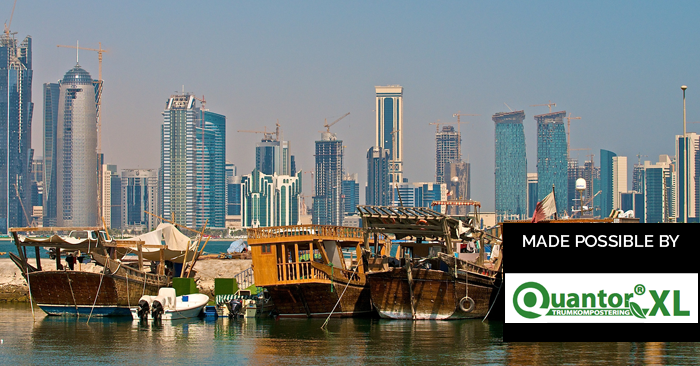TRANSCRIPT:
EM: So Daniel, today we’re focusing on the Middle East and just specifically your project in Qatar. But before we get into that, maybe you can give us just a little background information. It seems that recycling is gaining traction in the Middle East, why do you think that is?
DM: It certainly is, I mean, organic waste is what smells and that attracts bacteria and disease. And when you got a prosperous nation like the UAE for example, you know, it’s growing. And the cost of land in using landfills or dumps is becoming very expensive and it can play a detrimental role to society, and just general health and living standards. So, what we try to do is to treat the organic waste on-site or in a collective method on a site next to, or within, the landfill or dump, therefore actually minimizing the organics that goes into the landfill or dump, which we think is a waste of resources, and turning it into compost.
EM: That’s a brilliant idea actually, that’s really cool. So they have a pressing need to recycling, I suppose. But what are the challenges you’ve seen to introducing recycling systems? I presume the notion of recycling is gaining popularity?
DM: It is, it is. There are elements and drivers, but the current practices there at the moment (and there are improvements to this) is that there’s little awareness campaigns (although this is improving), there’s very little source-separation activities, there’s minimal compost development. So, putting quality back into the soils is paramount, especially in a region that is purely desert. There’s in increase in migrant populations, so therefore, when they’re building infrastructure; roads, airports, shopping malls, there are more people producing more waste. So the economic growth in that area contributes to growth in waste generation per person. And if you look at the statistics in the Middle East, for example in the UAE or Qatar, per kg per person it’s on of the highest in the world.
EM: Wow, okay so there’s a lot of work to be done there. And you’ve been part of that work yourself in Qatar, in The Pearl which is a high-end residential and retail complex is that right?
DM: Yeah, the Pearl, which is run by UDC (the United Development Company), based in Qatar as you said, is a beautiful residential and retail complex. And people pay for prosperity, and do not want to see waste, and management are very pro-active and are always looking at ways to add value to the good work already done there.
We identified through our waste management audit, when we were asked to conduct that exercise, that there’s a huge need for landscaping, and maintaining beautiful grounds and floral settings. The Pearl imports everything –
EM: Yeah, just, because actually I remember you saying before, and I thought this was really, interesting, but they import the plants as well, do they?
DM: Yes. They’ve started to develop their own nurseries there but as you can appreciate with the weather, the extreme heat, it’s not always easy. And accessibility to good water, which is suitable for plants, is not always easy to ascertain as well. So, one of the things that we were able to do was, in example, with the workers camp there, they feed them 24/7. Their food is placed directly into the Biobin for on-site treatment. This is turned into compost, then placed onto the garden beds. So there’s less money spent on rubbish removal, importing soil conditioners and plants, and that means The Pearl can manage this themselves.
At the same time, we’ve been able to educate the kitchen staff in better practice of food waste management, and educate the staff in effective management practices in source separation methods as well.
EM: Alright, and was there any other habits that you observed that could be changed?
DM: Yeah, we found that a lot of the watering is done during the day. From an environmental perspective, it is a natural resource and it makes it very difficult when you’re watering in extreme temperatures during the day. That means the irrigation system isn’t working until it’s full at maximum, the plants are dying more readily because there isn’t conditioner in the soil, like a fetiliser. So we’ve been able to actually put the compost on there, therefore extending the lifespan of that plant, and less water required.
EM: Cool, so it saves water as well.
DM: Absolutely. It acts like a sunscreen.
EM: That’s really cool. And so did change happen in The Pearl and more generally, what do you think we can do to inspire influencers to change their systems?
DM: Well firstly, it’s about meeting people within the organisation, understanding their vision, their objectives and their values, and finding the like-minded people and objectives coming together. Secondly, the organisation has to have a strong commitment to environmental issues. And without sounding too cynical, there are many environmental policy statements on all organisations in any website or any other documented policy: it’s whether they actually act on it. And thirdly it’s to make environmental, commercial and social sense.
So, leadership is required and it starts at the top, and it’s about changing their behaviour, so if you improve the task, then you improve the process, and you improve the result, which ultimately improves the performance. So very, very quickly and not in any particular order: it’s about changing culture, and policy and procedures. Everyone works to a task and duty, so if you change that task and duty to make it more effective, more efficient, and more aligned to environmental practices, then you improve the results and the performance. Apart from education and training, you have to look at current plans in place for growth and development, so therefore it’s not just a gimmick; it’s part of everyday use. And with that everyday use, that becomes part of the culture of the organisation, and then that sends a powerful message across the rest of the organisation or the complex that it’s a standard that you’ve developed. And you never go back.
EM: Awesome. So, after the Qatar project – or you’re still involved in the Qatar project aren’t you?
DM: Yeah. We go as regular visitors there in Qatar, and we’ve ascertained new clients, and these are catering companies and food processing plants as well. Because what they do is, a large part of their business is producing food waste, and that food waste is something that we could put back into the ground. And at the moment what their doing is, they’re stopping their work, getting transport companies to pick up the bins and the skips, and they’re paying them to drive across the country to actually dump. We’re saying that you don’t need that. If you eliminate the unnecessary practices and develop new ones, you’d be surprised at the results you can achieve.
And in Qatar, especially for The Pearl, we’ve allowed them to enhance their landscaping services, for example, there’s cost savings in labour and products, there’s been training for staff, there’s efficiencies introduced in water usage, and greater yield of plant as I’ve discussed earlier. The dying plants don’t need to be disposed of; they can go into the Biobin. Planting is more effective and more efficient, in the sense that you’ve already got quality in the soils to work with. There’s less need and requirement for watering because of compost. And we’re able to demonstrate the sustainability loop.
So it’s been more of a win-win and a “win-win” as we’re there doing the work. The more we understand the client, the more we understand their current practices, we can actually introduce new methodologies based on their local circumstances, and therefore fit into their practices. And it’s actually worked in a wonderful way for mutual benefit.
EM: Brilliant. And how important, then, is understanding business culture, to making recycling a popular choice?
DM: It’s very important because decisions in business should be based on data and fact, especially in relation to waste and environmental…many businesses initially don’t know how things are spent. They have beautiful budgets, they have beautiful accounting and financial systems, but if you ask them to break down the frequency of the use and the spending habits, and asking “why”, it’s very, very different. So, business culture should be part of a process of imporvement – an improvement culture. As I said earlier it’s first to understand the problem and then make improvements.
If you have a methodology of measuring and reporting waste levels, this further promotes engagement. So, you’re using the standardised methodologies at a business or a workplace level, to allow targeted analysis and prevention. That means if you have data and facts in front of you, you are a much more informed decision-maker, and it can be driving by the establishment of waste prevention targets. At the moment, a lot of places we visit don’t have targets at all, because they don’t know that there is a…or, they know that there’s a problem – that’s why they’re talking to me – but they don’t know that we can actually dissect it, and then try and put in some new technologies and methodologies.
EM: And what role should local governments play in driving change in this part of the world?
DM: Well one of things we’ve been able to do with our success, at a local level, is allow government and relevant stakeholders to play a pivotal role. They’re also talking about laws being introduced to ensure organic waste is handled in a responsible manner. And that’s a very general term, “being responsible”. It has to be better than what’s happening at the moment. There are laws and regulations, but they have to be enforced and monitored as well. So, we’ve been able to change a bit of habit and behaviour accordingly. And that’s been wonderful for us in the last ten months.
EM: Wow, that’s really cool, that’s really inspiring. And finally, do you have a quick word of advice for our listeners in similar situations?
DM: Yeah, certainly, I mean it’s not so much as a sales gimmick or a slogan, but you know, if you have a look at what we take from the ground, we should it back in the ground. When I do work in India, for example, Mother Nature allows trees at a certain time to lose their leaves. So in India what they do is they gather up the leaves and they burn them. In the end of the day, those leaves play an important role when they fall back to the ground and when you put them on soils because they act as a natural sort of remedy for the soil to be enhanced.
And from a government-driver perspective: you cannot achieve national and economical prosperity unless you invest in community outcomes. And a cleaner environment creates growth potential for economic and community prosperity.
EM: Brilliantly said. And unfortunately that’s all the time we have for today. Best of luck in the future now, and thanks for coming on the show!
DM: Thank you.
That was Daniel Mitroussidis for the Organic Stream on Compostory.org. If you have any questions or would like to learn more about ITSA’s work or the Qatar project, you can find Daniel’s email address on the ITSA website – that’s www.itsa.net.au. As always, you can find us on compostory.org or on Twitter: our Twitter handle is compostoryorg. Thanks for listening and hope you’ll tune in next time.


